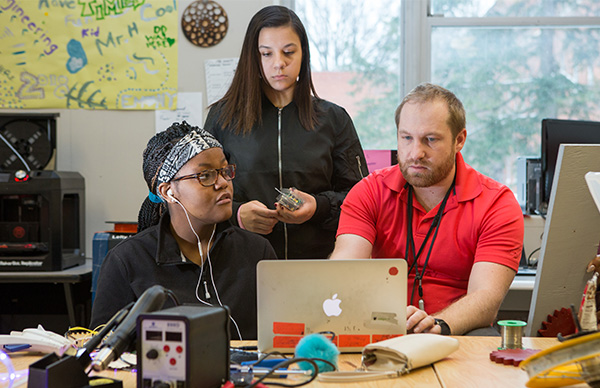 Artificial intelligence’s (AI) role in education is changing on a nearly daily basis. While the technologies evolve at the fastest pace in history, education leaders, educators, students, product developers, nonprofits in education, and educational philanthropic organizations must work together to define AI’s role in education to best support teaching and learning across contexts. Through this report, we aim to highlight the early successes of AI, surface the key barriers that call for cross-disciplinary and collective problem-solving, and highlight the ways each sector can drive forward an equitable future for AI in education. Read our report, “An Ethical and Equitable Vision of AI in Education: Learning Across 28 Exploratory Projects,” to learn more.
Artificial intelligence’s (AI) role in education is changing on a nearly daily basis. While the technologies evolve at the fastest pace in history, education leaders, educators, students, product developers, nonprofits in education, and educational philanthropic organizations must work together to define AI’s role in education to best support teaching and learning across contexts. Through this report, we aim to highlight the early successes of AI, surface the key barriers that call for cross-disciplinary and collective problem-solving, and highlight the ways each sector can drive forward an equitable future for AI in education. Read our report, “An Ethical and Equitable Vision of AI in Education: Learning Across 28 Exploratory Projects,” to learn more.
Given the rapid advances in AI and the momentum in the education field to understand how these technologies can support teaching and learning, last year the Gates Foundation launched a pilot initiative to provide funding to test new AI ideas that are in support of equitable K-12 mathematics outcomes. We wrote a series of blog posts to elevate the key learning from this set of investments.

Three Tips for Centering Teachers—Not Tools—in Generative AI Innovation

Before We Talk About AI Policy, We Should Talk About Priorities and Vision

What We’re Learning About AI’s Potential—And Limits—for Personalizing Educational Content

How Three Organizations Are Using GenAI to Advance Equity—and Combating Bias within It

Transforming K-12 Education with AI: A New Report with Insights from 28 Exploratory Projects
Noakes, S., Shell, A., Murillo, A., Van Nostrand, P., Ruiz, P., Cornick, S., and Karim, S. (2024, October). An Ethical and Equitable Vision of AI in Education: Learning Across 28 Exploratory Projects. Digital Promise. https://doi.org/10.51388/20.500.12265/232